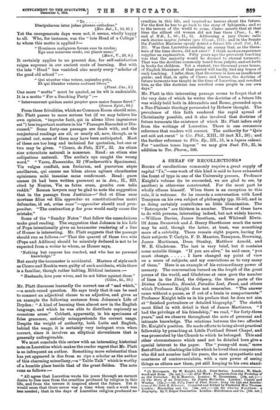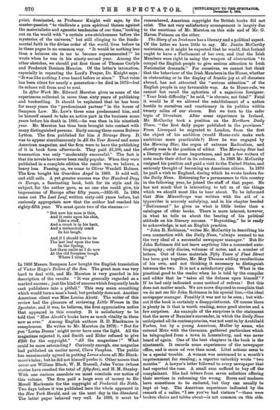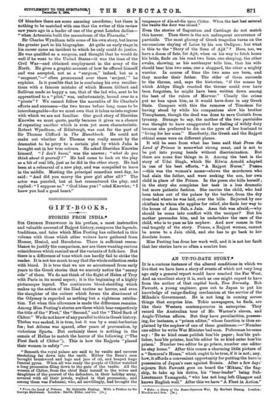Bowls of recollections commonly require a great supply of capital
"I's,"—one work of this kind is said to have exhausted the fount of type in one of the University presses.. Professor Knight's volume (to be succeeded, we are glad to see, by another) is otherwise constructed. For the most part he wholly effaces himself. When there is an exception to this rule, it is welcome. So he records a conversation with Lord Tennyson on his own subject of philosophy (pp. 55-56), and in so doing certainly contributes no little illumination. The " Retrospects " are thirteen in number. Three of these have to do with persons, interesting indeed, but not widely known, —William Davies, James Smetham, and Whitwell Elwin. Of Anna Swanwick and J. Henry Shorthouse much the same may be said, though the latter, at least, was something more of a celebrity. There remain eight papers, having for their subjects T. Carlyle, F. D. Maurice, Tennyson, Browning, James Martineau, Dean Stanley, Matthew Arnold, and W. E. Gladstone. The last is very brief, but it contains some notable things. "If you are alive," he said once, "you
must change I have changed my point of view on a score of subjects, and my convictions as to very many of them." Here is an example of his extraordinary power of memory. The conversation turned on the length of the great poems of the world, and Gladstone at once gave the number of lines in the Iliad, the Odyssey, the three parts of the Divines Commedia, Hamlet, Paradise Lost, Faust, and others which Professor Knight does not remember. "The answer came without a pause, as if out of a brain in compartments." Professor Knight tells us in his preface that he does not aim at "finished portraiture or detailed biography." The sketch most filled in with detail is that of James Martineau. "I had the privilege of his friendship," we read, "for forty-three years," and we observe throughout the note of personal and intimate knowledge. The relations between the two affected Dr. Knight's position. He made efforts to bring about practical fellowship by preaching at Little Portland Street Chapel, and was prosecuted by the Church to which he belonged. This and other circumstances which need not be detailed here give a special interest to the paper. The "young-old man," more fleet of foot in climbing the hills which be loved than companions who did not number half his years, the most sympathetic and courteous of controversialists, with a rare power of seeing things as others saw them, yet still keeping to his own stand- • (1) Retrospects. By W. Knight, LL.D. First Series. London: W. Black- wood and Sons. [9s. net.]—(2) After Work : Fragments from the Workshop of an Old Publisher. By E. Marston. London : W. Heinemann. [10s. net.]— (3) The Story of an Irishman. By Justin McCarthy. London : Chatto and Wincing. [12s.]—(4) Filly Years of Fleet Street : being the We and Recollec• lions of Sir John R. Robinson. Compiled and Edited by Frederick Moy Thomas. London : Macmillan and Co. [14s. net.]—(5) Ssr Charles Wyndham: a Biography. By T. Edgar Pemberton. London: Hutchinson and Co. [16s. net.]
the materialistic and agnostic tendencies of our time," looking out on the world with "a certain awe-strickenness before the mysteries of the universe," but still clinging to the funda- mental faith in the divine order of the world, lives before us in these pages in no common way. "It would be nothing less than a heinous sin in me to become superannuated !" he wrote when he was in his ninety-second year. Among the other sketches, we should put first those of Thomas Carlyle and Frederick Denison Maurice. Of the latter's intonation, especially in repeating the Lord's Prayer, Dr. Knight says : "It was like nothing I ever heard before or since." That voice has been silent for nearly a generation—he died in 1872—but its echoes roll from soul to soul.
In After Work Mr. Edward Marston gives us some of the experiences collected in more than sixty years of publishing and bookselling. It should be explained that he has been for many years the "predominant partner" in the house of Sampson Low. Mr. Low's three sons predeceased him, and he himself ceased to take an active part in the business some years before his death in 1886,—he was then in his ninetieth year. Mr. Marston has thus been brought into contact with many distinguished persons. Early among these comes Bulwer Lytton. The firm published for him A Strange Story. It was to appear simultaneously in All the Year Round and some American magazine, and the firm were to have the publishing of it in book form afterwards. They paid 21,500, and the transaction was only "moderately successful." The fact is that his novels have never been really popular. When they were published in a complete edition the result was, we believe, a heavy loss. Passing on, we come to Oliver Wendell Holmes. The firm bought his Guardian Angel in 1868. It sold well,
and still sells. A yet greater success was Our Hundred Days in Europe, a fascinating book, both for its style and its subject, for the author gave, as no one else could give, his
impressions of Europe after fifty years,-1835-85. In 1894 came out The Last Leaf, written sixty-odd years before, but curiously appropriate now that the author had reached his eighty-fifth year. We must quote two of the stanzas :— " But now his nose is thin, And it rests upon his chin, Like a staff, And a crook is in his back, And a melancholy crack In his laugh.
And if I should live to be The last leaf upon the tree In the Spring, Let them smile as I do now At the old forsaken bough Where I cling."
In 1866 Messrs. Sampson Low bought the English translation of Victor Hugo's Toilers of the Sea. The great man was very hard to deal with, and Mr. Marston is very guarded in his description of the results. "It was generally regarded as a marked success ; just the kind of success which frequently leads rash publishers into a pitfall." This may mean something which would turn a man's head, but probably does not. Another American client was Miss Louisa Akott. The writer of this review had the pleasure of reviewing Little Women in the Spectator, and it was, he believes, the first appreciative notice that appeared in this country. It is satisfactory to be told that "Miss .A.lcott's books have as much vitality in them now as ever." Among English authors R. D. Blackmore is conspicuous. He writes to Mr. Marston (in 1879) : "But for you 'Loran Doone ' might never have seen the light. All the magazines rejected it, and Smith and Elder refused to give 2200 for the copyright." "All the magazines !" What could be more astounding F Curiously enough, one magazine had published an earlier novel, Clara Vaughan. The public has unanimously agreed in putting Lorna above all Mr. Black- more's tales ; but he did not himself prefer it. Other names that occur are William Black, W. H. Russell, Jules Verne (whose stories have reached the total of fifty-five), and H. M. Stanley. With one curious anecdote we must conclude our notice of this volume. The firm paid a large sum of money to Sir Morell Mackenzie for the copyright of Frederick the Noble.
Two days before it was published here the whole appeared in the New York Herald, and on the next day in the Standard. The latter paper behaved very well. In 1888, it must be remembered, American copyright for British books did not exist. The not very satisfactory arrangement is largely due to the exertions of Mr. Marston on this side and of Mr. G. Haven Putnam on the other.
The Story of an Irishman has a literary and a political aspect. Of the latter we have little to say. Mr. Justin McCarthy maintains, as it might be expected that he would, that Ireland ought to have a Parliament of her own, and that the Irish Members were right in using the weapon of obstruction "to compel the English people to give serious attention to Irish Nationalist demands." For ourselves, we cannot but think that the behaviour of the Irish Members in the House, whether in obstructing or in the display of frantic joy at all disasters abroad, has not attracted the "serious attention" of the English people in any favourable way. As to Home-rule, we cannot but recall the aphorism of a sagacious foreigner. "Your Irish difficulty," he said, "is chronic, not fatal." Fatal it would be if we allowed the establishment of a nation hostile to ourselves and reactionary in its politics within twenty miles of our shores. But we turn to the safer topic of literature. After some experience in Ireland, Mr. McCarthy took a position on the Northern Daily Times, "the first daily paper published in the provinces." From Liverpool he migrated to London, from the first the object of his ambition (would Home-rule make such ambitions more practicable ?) Here be was engaged by the Morning Star, the organ of extreme Radicalism, and shortly rose to the position of editor. The Morning Star had a literary side of some importance, and not a few writers of note made their debut in its columns. In 1868 Mr. McCarthy resigned his position and paid a visit to the United States, and seriously thought of becoming an American citizen. In 1870 he paid a visit to England, during which he wrote leaders for the Daily News. Returning for a permanence to this country in the following year, he joined the staff of that paper. He has not much that is interesting to tell us of the things which we should most like to hear about. To be informed that Miss Misanthrope was written with the aid of a typewriter is scarcely satisfying, and in his chapter headed " Retirement " he gives us what is little better than a catalogue of other books. There is more interest, however, in what he tells us about the bearing of his political attitude on his literary success. "Boycotting," he is ready to acknowledge, is not an English practice.
"John R. Robinson," writes Mr. McCarthy in describing his own connection with the Daily News, "always seemed to me the very ideal of a successful newspaper manager." But Sir John Robinson did not leave anything like a connected auto- biography ; only diaries, volumes of notes, and a number of letters. Out of these materials Fifty Years of Fleet Street has been put together, Mr. Moy Thomas adding recollections of his own, and not thinking it necessary to distinguish between the two. It is not a satisfactory plan. What is the practical good to the reader when he is told by the compiler and editor that he "takes all the dulness upon himself" ? If he had only indicated some method of redress ! But this does not matter much. We are more disposed to complain that we do not see Sir John Robinson in his special line,—the ideal newspaper manager. Possibly it was not to be seen ; but with. out it the book is certainly a disappointment. Of course there is plenty in it that is worth reading, some good stories and a few surprises. An example of the surprises is the statement that the news of Bazaine's surrender, in which the Daily News anticipated all its contemporaries, was not sent in by Archibald Forbes, but by a young American, Muller by name, who entered Metz with the Germans, gathered particulars which he telegraphed from a town in Luxemburg, and was never heard of again. One of the best chapters in the book is the nineteenth. It records some experiences of the newspaper office, and is more ad rem than most. Libel actions seem to be a special trouble. A woman was sentenced to a month's imprisonment for stealing; a reporter unluckily wrote "two months." A lawyer's letter followed to every newspaper that had reported the case. A small sum sufficed to buy off the complainant. She had letters from seven solicitors offering their services in redressing the wrong. Bores and madmen have sometimes to be endured, but they can usually be kept at bay. The American experience indicated by the remark of a caller, "I see you've had visitors "—there were broken chairs and tables about—is not common on this side.
Of blunders there are some amusing anecdotes; but there is nothing to be matched with one that the writer of this review saw years ago in a leader of one of the great London dailies- " when Artemisia built the mausoleum of the Pharaohs."
Sir Charles Wyndham tells some of his own story, but leaves the greater part to his biographer. At quite an early stage in his career came an incident to which he only could do justice. He was qualified as a surgeon, and thought that he would do well if he went to the United States—it was the time of the Civil War—and obtained employment in the army of the North. He gives a graphic account of how he offered himself and was accepted, not as a "surgeon," indeed, but as a "sergeant,"—" often pronounced over there serjent,' " he explains. Is it possible that he is confusing his own recollec- tions with a famous mistake of which Messrs. Gilbert and Sullivan made so happy a use, that of the lad who, sent to be apprenticed to a "pilot," was, unfortunately, bound over to a "pirate" ? We cannot follow the narrative of Sir Charles's efforts and successes—the two terms before long came to be interchangeable—for we must own that it takes us into regions with which we are not familiar. One good story of Sheridan Knowles we must quote, partly because it gives us a chance of repeating another which is even yet more characteristic. Robert Wyndham, of Edinburgh, was cast for the part of Sir Thomas Clifford in The Hunchback. He could not make out whether Sir Thomas was really meant by the dramatist to be privy to a certain plot by which Julia is brought out in her true colours. He asked Sheridan Knowles himself. "I don't know," was the answer; "what do you think about it yourself ?" He had come to look on the play as a bit of real life, just as he did in the other story. He had been at a rehearsal of a new play, and was compelled to leave in the middle. Meeting the principal comedian next day, he said : "And did you marry the poor girl after all?" The actor was puzzled, but at last remembered the play, and replied : "I suppose so." "God bless you! "cried Knowles; "I knew you had a good heart."








































































 Previous page
Previous page